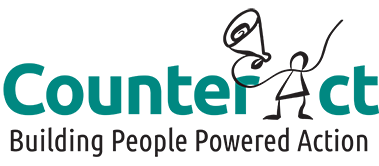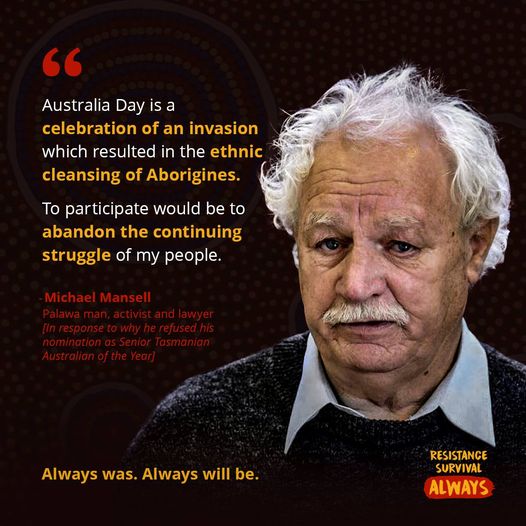First off. Listen.
That is what we are doing. And we aren’t writing this to centre our own experiences. We are writing it because we take the time to try and follow and listen to a range of Aboriginal voices. Also we might have access to information that you haven’t come across. We want to take away from emotional labour of Aboriginal people by supporting other allies with a collation of useful information.
So that is the first step. It’s not about us, it’s not about you. If you aren’t a First Nations Person, it’s about Aboriginal and Torres Strait Islander People.
And guess what – they have got different views. Like white people, or people descended from Sudan, or Vietnam, or people all named Becky.
What even do I call JAN 26 and what are people asking for?
Some people are calling to #ChangeTheDate and some people call it Invasion Day, Survival Day or Day of Mourning. Increasingly, more people are calling to #AbolishAustraliaDay. As a result it is likely this will mean different things to different First Nations people. What does seem to be commonly shared perspective – we shouldn’t be celebrating genocide.
Which is what happened when the first fleet landed on the shores of this continent. They occupied where hundreds of Aboriginal nations had already been prospering for 1000s of years. Similarly First nations people in America (referred to as Turtle Island by some) have issues with Thanksgiving Day.
White Australia’s collective amnesia on this goes to the core of some of our current injustices.
How can we talk about fixing things if we can’t admit there is a problem in the first place?
And some First Nations folks don’t support to Change the Date for that very reason. They would rather structural injustices were addressed. Youth incarceration and suicides, health issues, legal discrimination, children removed from family, deaths in custody, land grabs for minerals… and so much more.
Here is Tameeka Tighe in an interview with Sydney Criminal Lawyers “Firstly, the sovereignty of our lands has never been ceded. We want to exist as First Nations people peacefully in our Country in the way that we wish.
The overpolicing of our people. The deaths in custody of our people and the removal of our kids massively affects our existence as sovereign people in our Country.
The impact of the British arrival 233 years ago – with its imperialism. Has stopped our ability to exist peacefully as sovereign people in our homelands.”
There are a range of different views out there. Some of them really strongly held. A common theme tends to be that January 26 in its current form celebrates a day that is widely associated with mourning for blackfullas.
HOW CAN I SUPPORT?
Listen, be open to changing your mind. Be willing to hold the tension that comes from hearing different things from different First Nations folk you respect.
Go to events and rallies on Invasion day. If you’ve never been to a rally or protest before. We have legal resources, about your rights, and information on civil disobedience including a brand new one for NSW available here.
On the day and in the lead up. Don’t centre yourself. Please read this excellent article by Celeste Liddle about HOW ALLIES CAN HELP. Also, give money to mob run causes – even if you can only afford a few dollars. Check out the patreon account of IndigenousX. A few other favourites are Seed – youth climate activists, and Warriors of Aboriginal Resistance.
This meme was circulated last year with predictable backlash. Have a think on it. Our protocol on photos is that we ask for permission before taking any close up portraits, and particularly photos of kids, and older elders. And we generally take photos of speakers, performers, dancers who are clearly willing to be public, and crowd shots.
LISTEN TO ABORIGINAL VOICES
- Meriki Onus – Our calls for justice can not be silenced (2021)
- Roxanne Moore – First Nations people cannot celebrate while Australia is locking up our children (2021)
- Taryn Lee – What’s pride in a country without pride in ourselves? (2021 – Indigenous X)
- If your child asks why Australia is celebrating a day of invasion, what will you tell them? (2021) Amy McQuire and in (2017) January 26th was an assault on a strong, phenomenal culture — and that is why you shouldn’t celebrate it
- Nakkiuh Lui Australia day is a time of mourning
- Maggie Walter on changing the date
- How to be a good Indigenous Ally good SBS article
- Vanessa Turnbull – Roberts The onus is no longer on Indigenous Australia. Come and rise to change the nation.
- 10 Things you should know about January 26th As the highly political 26 January approaches, here are some important historical moments (beyond the First Fleet)
- Luke Pearson on Invasion Day, Survival Day, or Day of Mourning? All of the above.
- Chloe Sargent on the many different dates we have celebrated Australia Day
There is a lot of great information and stories in these articles above and it is great that these voices are speaking out strongly. This is a win for all of us.
Below is some more reading for you.
- Tony Birch in Indigenous X … also IndigenousX run a group sourced project on twitter, highlighting Aboriginal voices each week. Follow them on twitter or support their work on patreon (they also collaborate with allies on high impact story telling)
- Steven Oliver – shares mixed views and feelings about changing the date
- Jack Latimore – “It’s convenient for people to say Aboriginal people support Australia day, but it’s not true”
And some really great podcasts here from The Commons Library.
DO SOME EMOTIONAL LABOUR
Here is a guide to “changing minds without ruining the BBQ” and this website outlines the issues in simple language if you need an entry level explainer for a friend or family confused on the issue. Though it seems to be coordinated by both black and white folks, and possibly has religious funding, so might not be for everyone. We are happy to hear feedback about this inclusion.
Also, there are some quality gems here from Briggs if you like your social change a bit more cheeky. (And in general Twitter and TikTok is where its at for a range of strong young black voices)
We also wrote up and shared international and local perspectives on Black Lives Matters – with a treasure trove of resources that African American folks and Aboriginal people here have put together.
A few other tips
- Don’t expect First Nations folk to do emotional labour for you. Especially this week. Try and listen real hard to speeches and read articles to inform your understanding. Don’t ask them obvious questions. There are certainly other people who have asked them the same question.
- As requested by most rally organisers. Diffuse, don’t escalate. Lots of people, particularly radical activists, like to demonstrate their ally cred by shouting at racists. Therefore you are being asked not to. Marshalls at these events have been asked to support things staying calm.
- Don’t get too precious about a bit of paint. (and don’t show peoples faces on socials if they are creatively redecorating). There are already adequate laws in place to manage this – some might say they are already a little over the top. But regardless of your thoughts on graffiti, a splash of pink paint or a creative redesign is hardly comparable to many Aboriginal people being killed in custody. Or the grave injustices being protested.
- “Pay the rent” Unfamiliar concept? Learn more… It’s about trying to support Aboriginal voices and organisations. Paying ‘reparations’ of sorts for benefiting from living on colonised land. We make small contributions by allowing activists free spaces at our workshops. Paying small amounts to Aboriginal led causes and donating time, in lieu of money if we don’t have it. In the same vein other people donate directly to traditional owner groups and Aboriginal led organisations.
- Above all seek out and listen to Aboriginal voices. Make complaints to mainstream media and university discussions if they are debating these issues without Aboriginal voices. These writers above are a great place to start. Twitter is a really helpful place to follow mob voices.
- Oh, and try and limit the white tears. Someone will probably have an issue with this post. This is the internet after all.
- You can find more resources for allies here.
NOTE: This was first written in 2018 and has been added to.Though much of the information remains relevant, the debate has moved on, and continues to evolve with more discussion, so we’ve added more information about varying views.

